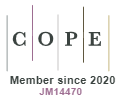Hypertensive response of blood pressure during exercise test in cardiometabolic patients
DOI:
https://doi.org/10.5585/conssaude.v18n2.10598Keywords:
Physical Exercise, Exercise Test, Blood Pressure, Chronic DiseaseAbstract
Introduction: Hyperreactivity of blood pressure (HRBP) is characterized by an abrupt increase in systolic and/or diastolic blood pressure during exercise testing (ET). Objective: To delineate the profile of patients with HRBP during ET and the factors associated with this response. Methods: Observational study developed from documentary analysis of ET of patients with HRPA. Spearman correlation test and multiple linear regression were applied (forward), p<0.05. Results: Negative and moderate correlations were observed between maximum oxygen consumption (VO2max) and variation in SBP, DBP and BMI (p<0.001, r= -0.675; p<0.001, r= -0.643; p<0.001, r= -0.504 respectively); DBP variation with myocardial oxygen consumption (MVO2; p<0.001, r= -0.483) and weight (p= 0.004, r= 0.540). It was found that VO2max correlated with maximum heart rate reached during ET (p= 0.004, r= 0.421). VO2max accounted for 53.56%, weight for 10.62%, and MVO2 for 4.88% of DBP variation. Conclusion: VO2max showed high and significant impact on hyperreactive behavior of DBP in patients with cardiometabolic diseases.
Downloads
References
Meneghelo RS, Araújo CGS, Stein R, Mastrocolla LE, Albuquerque PF, Serra S M, et al. Sociedade Brasileira de Cardiologia. III Diretrizes da Sociedade Brasileira de Cardiologia sobre Teste Ergométrico. Arq Bras Cardiol 2010; 95 (5 supl.1):1-26.
Kim D, Ha JW. Hypertensive response to exercise: mechanisms and clinical implication. Clin Hypertens 2016; 22:17.
Kokkinos P. Cardiorespiratory Fitness, Exercise, and Blood Pressure. Hypertension 2014; 64:1160-4.
Berger A, Grossman E, Katz M, Kivity S, Klempfner R, Segev S et al. Exercise Blood Pressure and the Risk for Future Hypertension Among Normotensive Middle-Aged Adults. J Am Heart Assoc. 2015; 4:1-7.
Schultz MG, Hordern LR, Coombes JS, Marwick TH, Sharman JE. Lifestyle change diminishes a hypertensive response to exercise in type 2 diabetes. Med Sci Sports Exerc. 2011; 43:764-9.
Wahab M. Is an exaggerated blood pressure response to exercise in hypertensive patients a benign phenomenon or a dangerous alarm?. Eur J Prev Cardiol 2016; 23:572-6.
Gaudreault V, Després JP, Rhéaume C, Alméras N, Bergeron J, Tremblay A et al. Exercise induced hypertension in men with metabolic syndrome: anthropometric, metabolic, and hemodynamic features. Metab Syndr Relat Disord 2012; 11:7-14.
Fletcher GF, Ades PA, Kligfield P, Arena R, Balady GJ, Bittner V A et al. AHA Scientific Statement: Exercise Standards for Testing and Training A Scientific Statement From the American Heart Association. Circulation 2013; 128:873-934.
Sharman JE, Lagerche A. Exercise blood pressure: clinical relevance and correct measurement. J Hum Hypertens 2014; 29:1-8.
Lauer MS, Levy D, Anderson K M, Plehn JF. Is there a relationship between exercise systolic blood pressure response and left ventricular mass? The Framingham Heart Study. Ann Intern Med. 1992; 116:203-210.
Lorbeer R, Ittermann T, Volzke H, Glaser S, Ewert R, Felix SB et al. Assessing cutoff values for increased exercise blood pressure to predict incident hypertension in a general population. J Hypertens 2015; 33:1386-93.
Kato S, Onishi K, Yamanakat, Takamura T, Dohi K, Yamada N et al. Exaggerated Hypertensive Response to Exercise in Patients with Diastolic Heart Failure. Hypertens Res. 2008; 31:679-684.
Doumas M, Faselis C, Kokkinos P. Exaggerated Blood Pressure Response to Exercise: Will It Ever Be Ready for Prime Time?. J Clin Hypertens (Greenwich) 2015; 17: 845-7.
Thanassoulis G, Lyass A, Benjamin EJ, Larson MG, Vita JA, Levy D et al. Relations of Exercise Blood Pressure Response to Cardiovascular Risk Factors and Vascular Function in the Framingham Heart Study. Circulation 2012; 125:2836–43.
Caldarone E, Severi P, Lombardi M, D’emidio S, Mazza A, Bendini MG et al. Hypertensive response to exercise and exercise training in hypertension: odd couple no more. Clin Hypertens 2017; 23:11.
Schultz MG, Otahal P, Cleland VJ, Blizzard L, Marwick TH, Sharman J E. Exercise-Induced Hypertension, Cardiovascular Events, and Mortality in Patients Undergoing Exercise Stress Testing: A Systematic Review and Meta-Analysis. Am J Hypertens 2013; 26:357-66.
Keller K, Stelzer K, Ostad MA, Post F. Impact of exaggerated blood pressure response in normotensive individuals on future hypertension and prognosis: Systematic review according to PRISMA guideline. Adv Med Sci 2017; 62:317-29.
Chrysohoou C, Skoumas J, Georgiopoulos G, Liontou C, Vogiatzi G, Tsioufis K et al. Exercise capacity and haemodynamic response among 12,327 individuals with cardio-metabolic risk factors undergoing treadmill exercise. Eur J Prev Cardiol 2017; 24:1627-36.
Brassard P, Ferland A, Gaudreault V, Bonneville N, Jobin J, Poirier P. Elevated peak exercise systolic blood pressure is not associated with reduced exercise capacity in subjects with Type 2 diabetes. J Appl Physiol 2006; 101:893-7.
Yang WI, Kim JS, Kim SH, Moon JY, Sung JH, Kim IJ et al. An exaggerated blood pressure response to exercise is associated with subclinical myocardial dysfunction in normotensive individuals. J Hypertens 2014; 32:1862-69.
Mitchell JH. Abnormal cardiovascular response to exercise in hypertension: contribution of neural factors. Am J Physiol Regul Integr Comp Physiol 2017; 312:851-63.
Michishita R, Ohta M, Ikeda M, Jiang Y, Yamato H. Effects of Lifestyle Modification on an Exaggerated Blood Pressure Response to Exercise in Normotensive Females. Am J Hypertens 2017; 30:999-1007.
Lee E, Lee K, Kozyreva O. The effect of complex exercise rehabilitation program on body composition, blood pressure, blood sugar, and vessel elasticity in elderly women with obesity. J Exerc Rehabil 2013; 9:514-19.
Downloads
Published
How to Cite
Issue
Section
License
Copyright (c) 2019 ConScientiae Saúde

This work is licensed under a Creative Commons Attribution-NonCommercial-ShareAlike 4.0 International License.
- Abstract 6967
- PDF (Português (Brasil)) 2375







